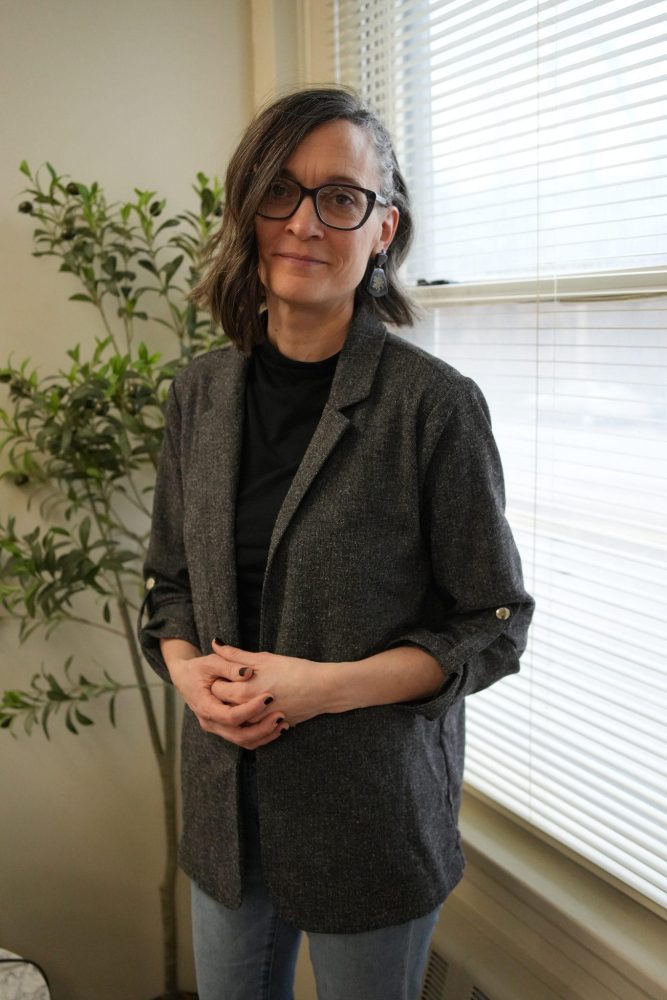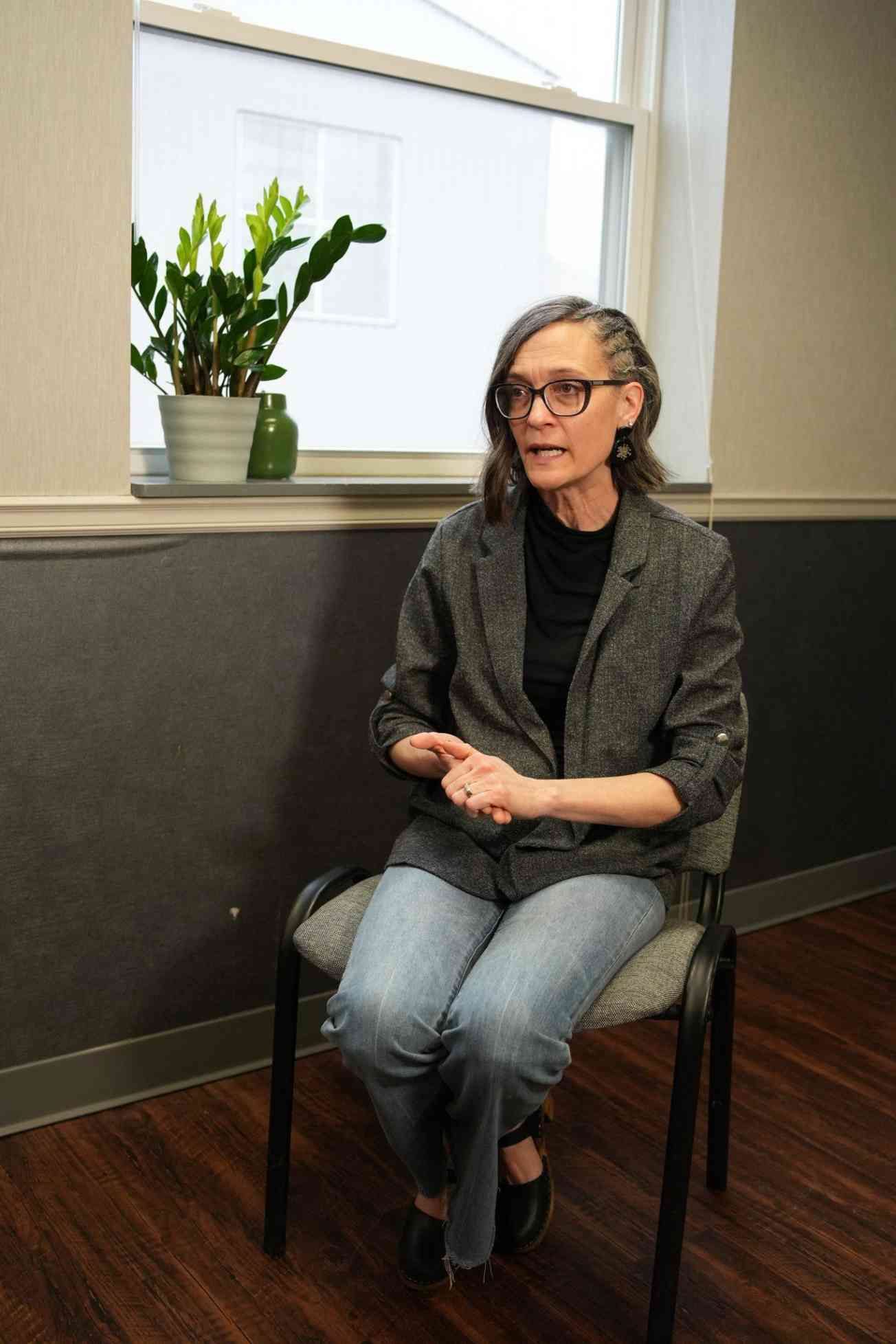Volunteers: The Key to Successful Refugee Integration
“I want volunteers who are going to be advocates for our families and to do this work for their whole lives.”

My name is Sarah Kolsto. I’m the refugee services director at Della Lamb. I’ve been here almost two and a half years.
I initially got introduced to refugee resettlement through a church group. They were doing basically what I would equate to our co sponsorship program now, which is where a group of individuals come together and say, “We’re going to support a newly arrived refugee family and walk with them for six months and help them with their integration.”
I got involved in a more official capacity when a friend of mine who was working here at the time, told me, “Hey, we’re getting ready to kick off this co sponsorship program. We really need somebody to come in and spearhead it.” It was just after COVID. I wasn’t employed at the time. And I thought, Oh, I think this would be a really great opportunity for me to kind of step in. I felt like it kind of catered to some of my skills and my gifts in general. And so I said yes. It was September 2021. It was a crazy time! Kabul had just fallen to the Taliban. I’m trying to get this program off the ground. It kind of started slow, but by the end of October, November, we were getting 400 arrivals in three months. And at the same time, I’m trying to mobilize volunteers to kick off this program. It wasn’t perfect, but we needed as many volunteers as we could get. So I think I mobilized 10 to 12 groups during that time to partner them with Afghan families.
If you look at resettlement more broadly, there is a lot of volatility in the work. There's zero stability in resettlement.
You had the previous administration drastically cutting the number of people we allowed into this country. Then resettlement agencies are forced to then cut their staff. When I started here, in 2021, we had nine resettlement employees. Nine people, and that was up from a few months prior we were hiring. Now we have over 50. That’s two and a half years. If you consider that exponential growth, that’s insane. The way that resettlement is structured is that the presidential administration is the one who has the say and how many people we’re going to receive. The resettlement agencies are the ones that have to pivot to respond to that, but we have no time to do that. So if you get another Trump in office, or somebody who shares his views on refugees, we’ll be forced again to make some really hard decisions with our staff, staff that we’ve just spent years investing in and training. Then maybe the next time, you get somebody who’s empathetic to immigration and refugees. Then what do you do? Go on a hiring spree? Find new people? It’s probably not the same people who left, because they were burned out, so you find new people to invest in. So it’s the lack of stability that makes refugee resettlement so hard.
Until resettlement becomes a people issue and not a political issue, our clients are going to suffer.
People that don’t work in this field don’t really understand what it takes to resettle one family. It’s really hard. All of our families come with so many different needs. Some of them have fewer barriers than others. Some of them speak perfect English. That’s great. We can get you a job. We can work with you day to day. But then we have our single moms. We have people with severe mental health issues. We have people that are pre-literate in their own language. There are so, so many different barriers and people that haven’t experienced this work on the ground don’t understand what’s involved.
I’m all about education. Anytime I get an invitation to a church or an organization, if somebody wants to come in and see what we do, I say yes, yes! Come in so I can talk to you. I think education and advocacy and having more people who know and can share with their own community and networks of people is crucial to building more stability. I am always asking, “How can you affect change at the local level?”
I like to give people multiple ways that they can step into this work, because to step in as your first experience as a co sponsor is really intimidating. A six month commitment walking alongside a family is really intimidating. But are there different ways that you can experience this work, and then potentially work up to forming a co sponsor team? Yes.
We're developing different pathways for people to step in. I want volunteers who are going to be advocates for our families and to do this work for their whole lives.

You also have to look at resettlement from a really personal perspective. This is about people’s lives. I’ve realized through this work that people just want to feel heard. They just want to know that they’re not alone, that we’re not going anywhere as an agency, that we’re going to continue to support them. It can be really easy as a caseworker to brush past that personal connection because you have to check off a list. You need to make sure you’re doing everything correctly. So how do we walk that line? And how do we take the time to actually listen to our clients? It brings so much reassurance to them when they don’t feel like they’re just a checklist to get through. But because of the way we’re structured in resettlement, there’s so much pressure on that checklist. So teaching everybody to walk that line can be really, really hard.
Our clients bring me so much joy. If you need to be refueled a little bit, go to an airport pick up where there’s a person that hasn’t seen family in a decade or more and are reunited. Go to that airport pick up and see what we’re a part of. We’re a part of reuniting families that have been separated for decades. We’re a part of bringing families out of refugee camps. We have one family that we resettled last year, a family of 12. All their kids were born in a refugee camp. Now they’re in a house. Their kids are in school, they’re working jobs, they’re doing great. I love those stories. This isn’t just a job. This is about people and we’re affecting their lives in really positive ways.
If you meet any of our clients, you know why Kansas City is better with refugees. You know the diverse neighborhoods, you know the stories that they bring, you know the innovation and economic growth and the small businesses they start. But they’re also just beautiful people who contribute to the beauty of our society. If you meet them, you know why our city is better.
I just want people to know that these are our neighbors. And refugee resettlement agencies can’t do this without the help of the community. I’m really motivated by my faith. I think it’s who we’re called to be—welcoming the stranger, welcoming the immigrant and refugee, aligning ourselves with the vulnerable instead of aligning ourselves with the powerful and financially secure.
Broaden your family’s view of what their life can look like, how they can impact others, how they can partner with others, how they can advocate for the vulnerable. Step into that. People are really scared to step into what they don’t know. They’re really scared to be uncomfortable with people that are different from them. But I’m always challenging people on that because I think, if you don’t expose yourself to it, you’re gonna miss it.
Our team members obtain informed consent from each individual before an interview takes place. Individuals dictate where their stories may be shared and what personal information they wish to keep private. In situations where the individual is at risk and/or wishes to remain anonymous, alias names are used and other identifying information is removed from interviews immediately after they are received by TSOS. We have also committed not to use refugee images or stories for fundraising purposes without explicit permission. Our top priority is to protect and honor the wishes of our interview subjects.